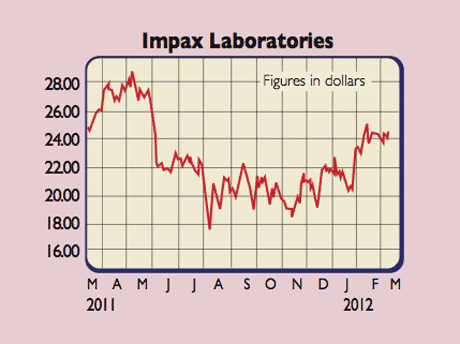Get the latest financial news, insights and expert analysis from our award-winning MoneyWeek team, to help you understand what really matters when it comes to your finances.
You are now subscribed
Your newsletter sign-up was successful
Want to add more newsletters?

Twice daily
MoneyWeek
Get the latest financial news, insights and expert analysis from our award-winning MoneyWeek team, to help you understand what really matters when it comes to your finances.

Four times a week
Look After My Bills
Sign up to our free money-saving newsletter, filled with the latest news and expert advice to help you find the best tips and deals for managing your bills. Start saving today!
To save money, governments, including Britain's, are refusing to pay for expensive medical treatments where health improvements are deemed marginal. They are also getting doctors to prescribe more generic drugs, rather than their more expensive branded counterparts. Generic drug manufacturers could therefore get a boost in 2012 as $34bn worth of drugs in America alone are due to lose patent protection. It's estimated that more than 50% of prescription medicines will be open to copycat versions before the end of 2015, in a market that's already 80% generic.
It won't all be plain sailing for the generic manufacturers, who are facing tougher competition. Of the 22 biggest drugs facing patent expiries this year, almost 75% will trigger at least two low-cost copies. The bigger ones could attract as many as ten. To succeed, a firm needs to do something more than churn out mass-produced tablets. This is where California-based Impax Laboratories comes in. Focusing on niche therapeutic areas, it already sells 102 generic products, including its top-selling clone of Shire Pharmaceutical's attention deficit hyperactivity drug, Adderall.
Impax is also formulating its own in-house medicines in areas such as Parkinson's disease, restless legs syndrome and spasticity in patients with multiple sclerosis. In February, it spent $130m for the US distribution rights to AstraZeneca's migraine treatment, Zomig. The agreement, which is expected to enhance earnings immediately, also permits Impax to develop its own drugs containing the Zomig molecule. At the fourth-quarter results, the chief executive, Larry Hsu, said: "Our internal generic pipeline continues to expand with 45 compounds waiting for approval at the Food and Drug Administration (FDA). We're also excited about our branded business."
MoneyWeek
Subscribe to MoneyWeek today and get your first six magazine issues absolutely FREE

Sign up to Money Morning
Don't miss the latest investment and personal finances news, market analysis, plus money-saving tips with our free twice-daily newsletter
Don't miss the latest investment and personal finances news, market analysis, plus money-saving tips with our free twice-daily newsletter
Impax Laboratories (Nasdaq: IPXL), rated a BUY by Piper Jaffray

For 2012 Wall Street is expecting turnover and underlying earnings per share (EPS) of $664m and $1.83 respectively. That puts the stock on an undemanding price/earnings (p/e) ratio of 13. I rate the business on a ten-times EBITA multiple, which, adjusted for proforma net cash of $216m, generates an intrinsic worth of about $30 a share.
As for risks, Impax is exposed to intensifying competition, the usual regulatory hurdles and pipeline setbacks relating to its own research and development efforts. It is also awaiting final clearance from the FDA, after being issued with a warning letter following an audit of one of its factories. The board is confident it has addressed the issues.
Piper Jaffray has a price target of $32 per share, with first-quarter results due out in early May.
Paul Hill also writes a weekly share-tipping newsletter, Precision Guided Investments. See www.moneyweek.com/PGI , or phone 020-7633 3634 for more.
Get the latest financial news, insights and expert analysis from our award-winning MoneyWeek team, to help you understand what really matters when it comes to your finances.
Paul gained a degree in electrical engineering and went on to qualify as a chartered management accountant. He has extensive corporate finance and investment experience and is a member of the Securities Institute.
Over the past 16 years Paul has held top-level financial management and M&A roles for blue-chip companies such as O2, GKN and Unilever. He is now director of his own capital investment and consultancy firm, PMH Capital Limited.
Paul is an expert at analysing companies in new, fast-growing markets, and is an extremely shrewd stock-picker.
-
 How a ‘great view’ from your home can boost its value by 35%
How a ‘great view’ from your home can boost its value by 35%A house that comes with a picturesque backdrop could add tens of thousands of pounds to its asking price – but how does each region compare?
-
 What is a care fees annuity and how much does it cost?
What is a care fees annuity and how much does it cost?How we will be cared for in our later years – and how much we are willing to pay for it – are conversations best had as early as possible. One option to cover the cost is a care fees annuity. We look at the pros and cons.